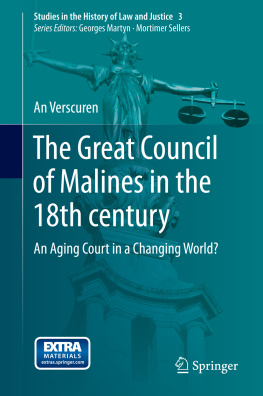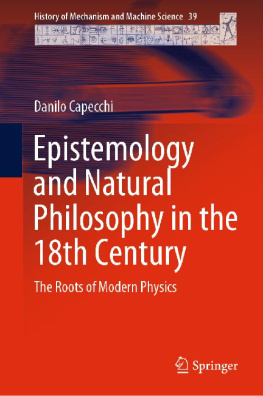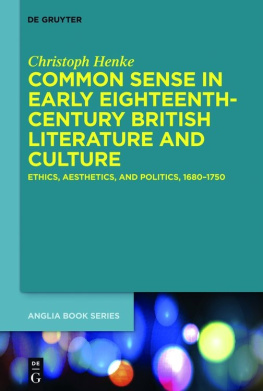1. Introduction
In general, historians writing the annals of an institution are rarely able to resist the temptation to focus on the foundations upon which it was built or on its heyday in terms of power and prestigewith its later years and ultimate vanishing treated as a mere afterthought. As a consequence, writing its history would amount to nothing more than describing its often slow and steady deterioration.
The Great Council of Malines, officially established in 1474 and abolished in 1797, is no exception to this rule. Even though this tribunal is unmistakably one of the most thoroughly researched institutions of the Ancien Rgime Netherlandsand in the past, it even boasted its own dedicated research group
The study at hand examines the eighteenth century Great Council of Malines, focusing on the personnel and composition of the tribunal, its functioning and its position within the Austrian Netherlands, the nature and volume of litigation at the Council and its final years in the late eighteenth and early nineteenth centuries. While this work has a strong linkage to legal history, it is in the first place embedded in the domain of institutional history. Indeed, we examined the tribunal as an institution with special attention to its role as instrument of princely policy in the eighteenth century Austrian Netherlands.
The fact that this research project was housed within the Belgian State Archivesproviding us with the luxury of working literally in the midst of the Great Councils original recordscertainly influenced this study. Primary sources constitute the foundation of our research. Working as an archivist also gave us some idea of how record keeping in the Great Council was doneor not doneand made it possible to look for pieces of the puzzle in sometimes unexpected places. Moreover, it also provided us with some basic insight into the possibilities offered but, even more importantly, into the constraints imposed by the surviving archives. Finally, we observed that (ideas on) record keeping changed significantly throughout the centuries, which inevitably influenced the data available. As a result, both because of their intrinsic importance and because of their significance for our work, the Great Councils archives as well as the influence they have had on our understanding of its eighteenth century history are discussed at several points throughout this work.
1.1 A Short History of the Great Council of Malines
The Early Centuries
As Van Rompaey demonstrated, the origins of the Great Council can be traced back to the curia ducis of the Burgundy period, a council consisting of both professional jurists and noblemen who advised the dukes on general political, financial and judicial affairs. Under the reign of Philip the Good (14191467) the increase in the number of cases the curia ducis dealt with induced a specialization of the councilors. While the noblemen were engaged in political matters, legal questions were increasingly assigned to professional jurists. Around 1445, the latter broke away from the curia ducis to form a more or less independent institution: the Great Council of Justice. Despite its autonomous status, the Great Council still worked in close cooperation with the ducal council and remained an ambulant tribunal, following the duke wherever he went. Over the next 30 years, the gulf between the Great Council of Justice and the curia ducis widened and the former became de facto a separate institution. As a consequence, when in 1473 Charles the Bold established the Parlement of Malines with the Ordinance of Thionville, he did not so much create an entirely new institution but rather ratified a situation that had been in existence for several years. For the first time, the tribunal obtained a fixed residence in the city of Malines.
From a mere institutional point of view, the sovereign Parlement was merely the successor of the Great Council of Justice: in first and last instance, it dealt with certain cas rservs as well as with lawsuits involving privileged persons. Moreover, it also functioned as the court of appeal for a number of Burgundy territories. In theory, the Great Council added an additional instance, but otherwise left the former judicial organization largely in place. However, through the introduction of new techniques such as vocation ,
Van Rompaeys study leaves no room for doubt that the establishment of the Parlement of Malines had a political significance and responded to a two-fold desire: to complete the Burgundy policy of internal centralization and to underline the dukes full independence in legal matters, in particular from the King of France and his Parlement de Paris . Indeed, while until 1473 the Great Council had functioned as a court of appeal against judgments of some provincial tribunalsthe most important ones being Namur, Holland and Luxemburgthe French Parlement de Paris was still competent to deal with appeals coming from the larger part of Flanders, allowing the French sovereign to interfere in Burgundy matters. The Ordinance of Thionville eventually deprived the Parlement de Paris of its jurisdiction over Flanders: litigants who wished to appeal against a judgment of the Council of Flanders had to turn to the Parlement of Malines.
Charles the Bolds death a mere 4 years later signaled the demise of the Parlement. Pressured by the Estates-Generalwhich considered the Malines tribunal to be the prime symbol of the Burgundy Dukes policy of centralizationCharles daughter Mary granted the Grand Privilege which provided, among others, for the abolition of the Parlement . Yet, the Estates-General did not request the complete abolition of the court. Already in 1477, an ambulant Great Council once again functioned as a special tribunal; by the end of the fifteenth century, the workload of the Council was at a level comparable to that of the Parlement . The ordinance of Philip the Fair of 1504 established the Great Council once and for all in the city of Malines. From that time onwards, the tribunal had its seat in the Schepenhuis . In 1619, the councilors moved to the former palace of Margaret of Austria, where they would remain until the very end of the Ancien Rgime.
Even though the Great Council quickly recovered from the crisis of 1477, it did not immediately regain jurisdiction over the Council of Flanders. After the abolition of the Parlement of Malines, appeals against sentences of the Council of Flanders were again dealt with by the Parlement of Paris. In 1521, Charles V forbade the inhabitants of Flanders to appeal to the Parlement of Paris against sentences of their provincial tribunal, but it was not until 1526 that the Treaty of Madrid officially recognized the transfer of jurisdiction over Flanders from the Paris tribunal to the Great Council of Malines. In theory, this marked the definite end of French interference in the judicial affairs of the Netherlands, but in practice the Parlement de Paris would at several instances in the sixteenth and even early seventeenth centuries attempt to assert an influence over Flanders.
In the meantime, Charles V had tied in with the intermittent attempts of his Burgundy predecessors to unify his possessions in the Netherlands by creating and promoting a more or less hierarchized system of judicial institutions. The central courts corresponded to the litigants desire for professional competence: compared to the traditional bench of aldermen, the new princely councils guaranteed a much faster administration of justice, coupled with increased objectivity and legal security. In addition, its sentences had a much more broadly accepted legal force. For all these reasons, private persons as well as institutions made an increased use of the sovereigns administration of justiceboth on the provincial and the central levelto have their civil disputes settled.







